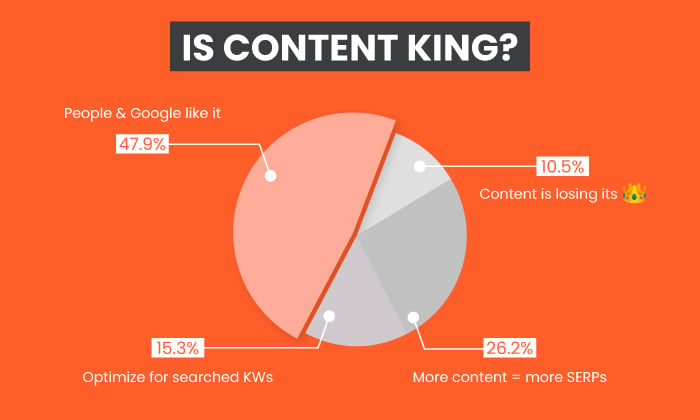
Tired of hearing “content is king?”
It’s a phrase that makes most marketers roll their eyes.
Does it still ring true? If so, why is content still so important?
Where Did the Phrase ‘Content is King’ Come From?
In 1996, Bill Gates wrote an essay that changed the course of digital marketing. Titled “Content is King,” he suggested most of the money generated on the internet would come from content, much like broadcasting.
Even more groundbreaking, Gates suggested content could serve as an equalizer because anyone (and any brand) could create and publish content:
One of the exciting things about the Internet is that anyone with a PC and a modem can publish whatever content they can create. In a sense, the Internet is the multimedia equivalent of the photocopier. It allows material to be duplicated at low cost, no matter the size of the audience.
Much has changed in the decades since Gates coined the phrase, so does it still ring true?
I set to find out by asking marketers and business owners on Twitter whether content is still king and why—or why not.
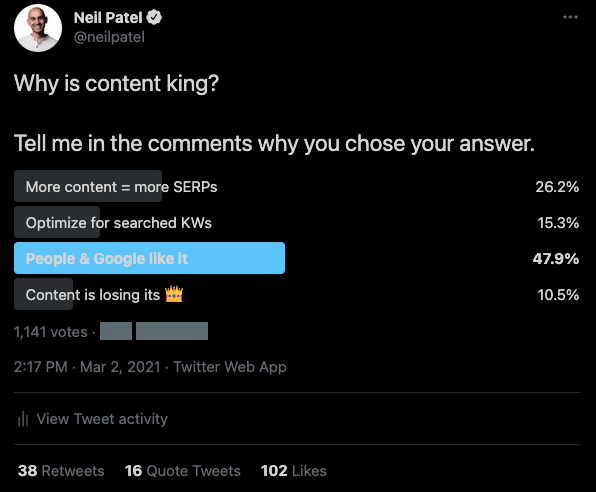
The results were split— the vast majority of people believe that content still reigns, but a growing number of people think content is beginning to lose its crown.
What is even more interesting is the reason why people think content is still supreme—and there are a wide range of opinions on that front.
So, is content still king? If so, why is it still so critical more than two decades after Bill Gates said content would be the force behind monetizing the internet?
Users and Google Like Quality Content
The vast majority of survey respondents said content is still king because Google and people like content.
There’s no doubt that Google likes content. According to a study of more than 11 million SERPs, the average word count for pages that rank on the first page of Google is 1,447 words.
That’s quite a bit of content.
While Google has been notoriously quiet about what exactly it takes to get in their good graces, many expert marketers (and a few Googlers) have stated that high-quality content is the key to ranking well on Google. Twitter followers agreed:
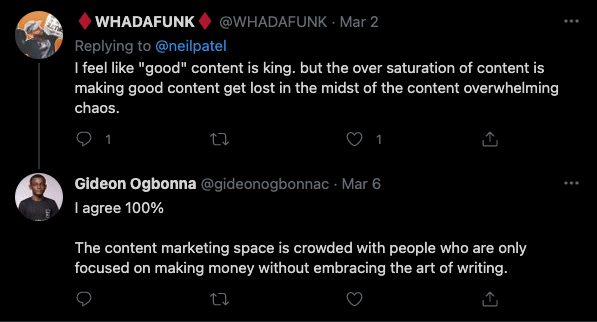
It’s not just Google who likes content—people do, too. In fact, global online content consumption doubled in 2020.
Content is also one of the most effective ways to turn readers into leads, with companies that blog earning 67 percent more leads per month than brands that don’t.
This is probably why most brands are investing 41 percent of their overall marketing budget on content.
However, there is one caveat that many businesses and marketers overlook—when we talk about content, we’re not just talking about blog posts and e-books.
One of the biggest misconceptions about content is that it only refers to written content.
Content also includes video, social media, virtual reality, podcasts, and any other type of content people can read, listen, or interact with. Good content also builds links, so various types of content create “linkable assets” which makes it easier to build links naturally because the content is useful.
Consider this:
- According to HubSpot, 93 percent of marketers report that video is an important part of their marketing strategy.
- More than half of U.S. consumers over the age of 12 listen to podcasts.
- Interactive content is 39 percent more likely to be rated as “very effective” at educating buyers than passive content.
If you rely on written content to bring in visitors and make Google happy, it may be time to expand your horizons.
More Content Improves Your Position in the SERPs
More than 15 percent of survey respondents reported that content is king because it increases your position in the SERPs.
Which is true. Mostly.
Google’s goal is to provide users with the most useful, relevant search results every time. Thus, it makes sense that more content is better, right?
Not quite.
It’s important to note that ranking high in the SERPs isn’t about quantity but rather quality.
Writing 50 terrible blog posts isn’t going to help you rank as high as three or four well-researched, well-written posts. Here’s more insight from Twitter:
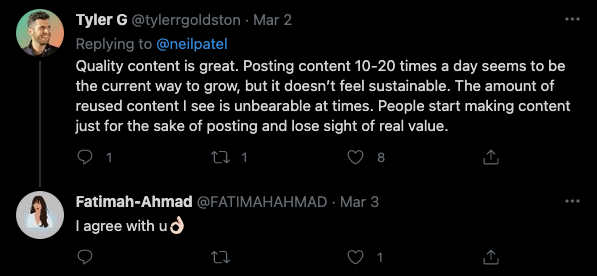
While more content will obviously improve your position in the search results, it’s crucial to focus on creating quality content, which includes:
- Be original: Google still dings sites that use duplicate content, so aim to create original content. Original content also tends to be more useful, as it provides users with information they can’t find anywhere else.
- Answer questions: Answering questions provides a good user experience and can help you land Google’s featured snippets, which show up at the top of search results.
- Be accurate: Add stats, links, and sources to back up your statements. This helps build trust with users and creates a resource other sites will want to link to.
- Engage readers: No one wants to read or watch boring content. Use a hook to grab readers and ask questions to create a conversation. Interactive elements, such as polls, contests, and surveys, can also help.
- Add images and videos: Images and videos break up long content and make it easier for users to understand complex ideas. Images also offer another opportunity for optimization through alt tags.
- Eliminate fluff: Get to the point; avoid useless modifiers, and make sure every heading is useful to site visitors.
- Be consistent: Creating good content is only part of the battle—if you want to improve your ranking, make sure to create content on a regular basis by creating an editorial calendar.
Content needs to be helpful to users, as reiterated on Twitter:
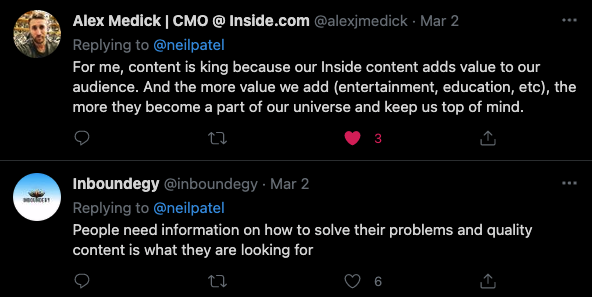
It’s also worth noting that tons of other factors can impact your ability to rank in the SERPs, including page experience, one of the newer Google ranking factors. Core website vitals also impact ranking.
Not having enough content on your site can affect your ability to rank in SERPs. If you are struggling to create high-quality content on a regular basis, our agency can help.
Content Helps You Optimize for Keywords
According to our survey, 15.3 percent of people think content is king because it helps optimize for keywords.
Which makes sense; keywords are the backbone of SEO.
However, optimizing for keywords goes beyond including them in your meta titles and adding it to your content as many times as possible.
In fact, the old way of targeting keywords is dead, thanks to Google updates like RankBrain and Hummingbird.
In the past, marketers found a single keyword (usually one that was low competition and had high search volume), wrote a post about it, sent it out via email and social media, did a little link building, and bam, Google rankings.
It’s not so simple these days.
Google has gotten smarter, and users have gotten savvier. If you want to rank for “how to do SEO,” for example, you can’t just publish a bunch of content about SEO.
Instead, you need to focus on related keywords, long-tail keywords, and user experience to rank well in Google.
You’ll also need to make sure your site speed is up to snuff.
However, writing high-quality, useful content is still one of the most important factors for optimizing for keywords—just don’t forget all the other factors that impact rankings.
Content is Losing Its Crown
Just over 10 percent of survey respondents reported that content is losing its crown.
Some people might just be tired of hearing about how content is the be-all and end-all of digital marketing.
I get it. The truth is there is a ton more to digital marketing than just creating content.
SEO, PPC, social media, technical SEO, and even link building are all crucial to increasing your Google rankings and driving leads and conversions.
If you search for “content is dead,” you’ll get tons of search results. Dig a little deeper, however, and those arguments don’t hold water.
Let’s look at a few of the most common reasons people claim that content is dead:
- According to CMSWire, brands are burned out from creating oceans of content and readers are tired of salesy, low-quality content.
- Dreamgrow reports content marketing is dead and 2021 is all about storytelling.
- Mark Schaefer claims content marketing is not a sustainable strategy because our ability to consume content is limited, while the amount of content is doubling every 9 to 24 months.
Essentially, all these claims boil down to one thing: Consumers are tired of crappy content.
They don’t want to read a 500-word post that offers little value and is mostly aimed at pitching a product or service. Twitter agreed:

Here’s the thing, though, consumers never wanted to read crappy content. That content used to help you rank in Google, but it never really converted the types of customers you’d actually want to keep.
What has changed?
The truth is, not much. Consumers want content that convinces, that educates, that provides useful, interesting information.
One thing has changed since the 1990s when Bill Gates penned his essay. The type of content users want has changed dramatically. Back then, sending a single photograph over the internet was exciting. Now, podcasts, videos, courses, and interactive content are rising in popularity.
Today’s consumers want content in all forms—video, audio, and even interactive content.
While Google updates like core website vitals are gaining momentum, none of the new ranking factors can rank your site all on its own.
For example, having a perfect user experience won’t help if there is no content for users to read or interact with.
Instead of assuming content is losing its crown, it might be time to dig deeper by having a consultant perform a site audit to see what content isn’t performing and update other issues your site might face, like slow load times.
Conclusion
Content is not losing its crown; it’s just expanding the royal family.
Despite what some marketers might think, it’s safe to say that content is not losing its luster anytime soon. Google likes it, people are consuming it at an ever-growing rate, and it can drastically improve your ability to rank in SERPs.
However, how we create content and the most effective types of content are changing.
Google is using artificial intelligence to better understand the context of content, making it more important than ever to use multiple keywords and incorporate long-tail keywords into your content.
People are tired of boring, dull, and salesy content. Other content types, like videos and interactive content, are likely to become the norm.
This means marketers need to up their content marketing game, not give up on it completely.
Is content still king? Share your thoughts in the comments.
About us and this blog
We are a digital marketing company with a focus on helping our customers achieve great results across several key areas.
Request a free quote
We offer professional SEO services that help websites increase their organic search score drastically in order to compete for the highest rankings even when it comes to highly competitive keywords.
Subscribe to our newsletter!
More from our blog
See all postsRecent Posts
- Web Hosting September 26, 2023
- Affiliate Management September 26, 2023
- Online Presence Analysis September 26, 2023

